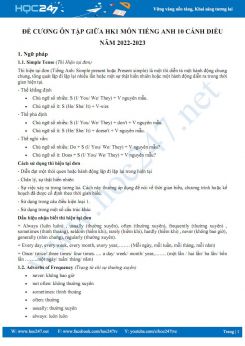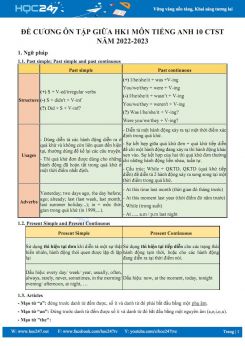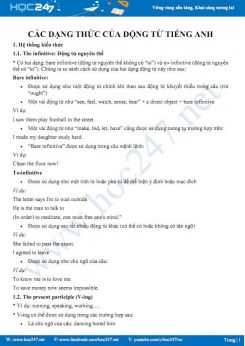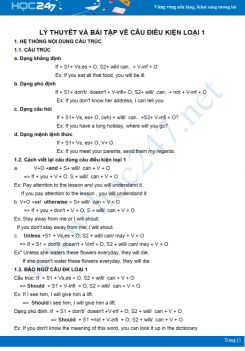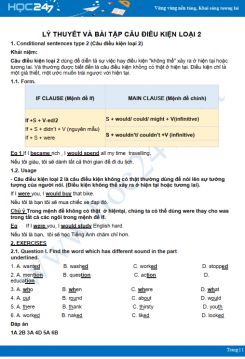Đề cương ôn tập giữa HK1 môn Tiếng Anh 10 Kết nối tri thức năm 2022-2023 là tài liệu được HOC247 biên soạn và tổng hợp với mong muốn cung cấp thêm tài liệu giúp các em học sinh có tài liệu học tập ôn tập trước kì thi giữa HK1 môn Tiếng Anh 10 Kết nối tri thức sắp tới. Hi vọng tài liệu này giúp ích cho các em củng cố ngữ pháp và rèn luyện kỹ năng làm bài. Chúc các em có kết quả học tập tốt nhé.
1. Nội dung ôn tập
Chương trình ôn thi giữa HK1 môn Tiếng Anh 10 Kết nối tri thức với cuộc sống trọng tâm Unit 1, Unit 2, Unit 3
1.1. Unit 1: Family Life
1.1.1. Câu điều kiện loại 1
Cấu trúc
a. Dạng khẳng định
If + S1 + Vs,es + O, S2 + will/ can.. + V-inf + O
Ex: If you eat all that food, you will be ill.
b. Dạng phủ định
If + S1 + don't/ doesn't + V-infi+ O, S2 + will/ can.. + not + V-inf + O
Ex: If you don't know her address, I can tell you.
c. Dạng câu hỏi
If + S1 + Vs, es+ O, (wh) + will/ can.. + S2 + V-infi + O?
Ex: If you have a long holiday, where will you go?
d. Dạng mệnh lệnh thức
If + S1+ Vs, es+ O, V+ O.
Ex: If you meet your parents, send them my regards.
Cách dùng
- Câu điều kiện loại 1 dùng để chỉ sự việc có thể xảy ra ở hiện tại hoặc tương lai
- Câu điều kiện loại 1 có thể sử dụng để đề nghị và gợi ý
- Câu điều kiện loại 1 dùng để cảnh báo hoặc đe dọa
1.1.2. Câu điều kiện loại 2
Cấu trúc:
If + S + V (chia ở thì quá khứ đơn), S + would/should (not) + V (nguyên thể)
Lưu ý:
- would not = wouldn't, should not = shouldn't
- If + not = Unless: Trừ khi/ Nếu không
Cách dùng:
Câu điều kiện loại 2 dùng để giả định về một sự việc không thể xảy ra ở hiện tại hoặc tương lai.
Ta thấy có thời gian ở hiện tại là “now” (bây giờ) và hiểu rằng “bây giờ họ không có nhiều tiền” nên mới đưa ra câu giả định như vậy. Vì thế ta sử dụng câu điều kiện loại 2 để diễn đạt một giả định về một sự việc không có thật ở hiện tại.
Lưu ý: Trong câu điều kiện loại 2, nếu mệnh đề “if” sử dụng động từ “to be” ở thì quá khứ đơn thì ta chỉ sử dụng “to be” là “were” với tất cả các ngôi.
Ví dụ: If I were you, I wouldn’t stay at home now. (Nếu tôi là bạn, tôi sẽ không ở nhà bây giờ.)
1.1.3. Câu điều kiện loại 3
Cấu trúc: If + S + had + V-ed/V3, S + would + have + V-ed/V3
Cách dùng: Câu điều kiện loại 3 diễn tả sự việc, hành động trái với thực tế tại quá khứ, thường dùng với nghĩa tiếc nuối.
1.2. Unit 2: Humans and The Environment
1.2.1. The future simple with “will”
- Khẳng định: S + will + Vinf
- Phủ định: S + will not/ won’t + Vinf
- Nghi vấn: (Từ để hỏi) + am + I + going to + Vinf?
- Các trạng từ chỉ thời gian trong tương lai
- Someday (một ngày nào đó)
- Tomorrow (ngày mai
- Next day/ week/ month ….. (tuần/ tháng …. sau)
- Soon (sớm thôi) ……
- Cách dùng:
- Hành động sẽ xảy ra trong tương lai, hoặc một hành động sẽ xảy ra trong một quãng thời gian dài ở tương lai
- Ý kiến, dự đoán của bản thân
- Lời đe dọa
- Quyết định ngay tức khắc, tự phát tại thời điểm nói
- Yêu cầu, đề nghị, lời mời
1.2.2. The future simple with “be going to”
- Khẳng định: S + am/ is/ are + going to + Vinf
- Phủ định: S + am/ is/ are + not + going to + Vinf
- Nghi vấn: (Từ để hỏi) + am/ is/ are + S + going to + Vinf?
1.2.3. Cấu trúc câu bị động với các thì
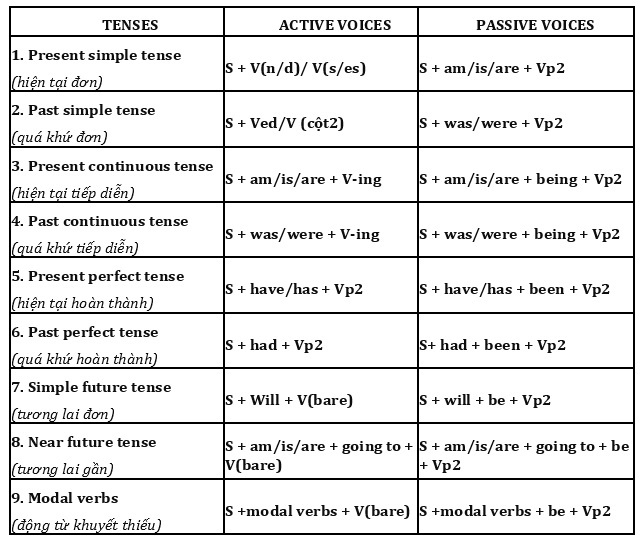
1.3. Unit 3: Music
Ôn tập động từ nguyên mẫu có to hoặc không có to
- Một số động từ theo sau là một To + Verb
- afford : có thể chi trả
- agree : đồng ý
- appear : có vẻ
- arrange : sắp xếp
- ask : yêu cầu
- attempt : cố gắng, thử
- beg : van xin
- can’t wait : nóng lòng được làm gì
- care : quan tâm
- choose : lựa chọn
- claim : đòi hỏi
- decide : quyết định
- demand : yêu cầu
- deserve : xứng đáng
- determine : xác định
- expect : kỳ vọng, mong đợi
- fail : thất bại
- get : có cơ hội được làm gì đó
- guarantee : đảm bảo
- hesitate : chần chừ
- hope : hy vọng
- hurry : vội vàng
- learn : học
- manage : xoay sở được
- neglect : bỏ bê
- offer : mời chào
- pay : trả tiền
- plan : lên kế hoạch
- prepare : chuẩn bị
- pretend : giả vờ
- promise : hứa
- prove : chứng minh
- refuse : từ chối
- request : yêu cầu
- seem : có vẻ
- tend : có xu hướng
- threaten : đe dọa
- volunteer : xung phong, tình nguyện
- wait : chờ đợi
- want : muốn
- wish : mong muốn, ước muốn
- Động từ nguyên mẫu không to được dùng:
- Sau các trợ động từ khuyết thiếu (modal verbs)
- Sau các động từ: let, make, help, see, hear, feel, watch, notice + tân ngữ.
- Sau các cụm động từ had better, would rather, had sooner và sau why hoặc why not.
2. Bài tập ôn tập
2.1. Choose the best answer
1. The teacher decided (accepting/to accept) the paper.
2. They appreciate (to have/having) this information.
3. His father doesn’t approve of his (going/ to go) to Europe.
4. We found it very difficult (reaching/ to reach) a decision.
5. Donna is interested in (to open/opening) a bar.
6. George has no intention of (to leave/leaving) the city now.
7. We are eager (to return/returning) to school in the fall.
8. We would be better off (to buy/ buying) this car.
9. She refused (to accept/ accepting) the gift.
10. Mary regrets (to be/being) the one to have to tell him.
11. George pretended (to be/being) sick yesterday.
12. Carlos hopes (to finish/finishing) his thesis this year.
13. They agreed (to leave/leaving) early.
14. Helen was anxious (to tell/ telling) her family about her promotion.
15. We are not ready (to stop/stopping) this research at this time.
2.2. Rewrite these sentences into passive voice
1. Have you sent the Christmas cards to your family?
2. The committee appointed Alice secretary for the meeting.
3. He hides the broken cup in the drawer.
4. They keep this room tidy all the time.
5. They all voted the party a great success.
6. We gave Ann some bananas and some flowers.
7. They moved the fridge into the living room.
8. She bought some cups of tea to the visitors in the next room.
9. They find the new project worthless.
10. The secretary didn’t take the note to the manager.
2.3. Put the verbs in brackets into the correct form
1. If I (find) ______ a cheap room, I will stay a fortnight
2. If I saw a tiger walking across the park, I ____ (climb) the tree
3. Why don’t you drive your car to work? If I ____ (have) a car, I would drive
4. He might get rid of his cough if he _____ (not smoke) so much
5. She was sent to the prison only because she refused to pay the fine; if she had paid the fine, she _____ (not be) sent to prison
6. The job is much worse than I expected. If I ____ (realize) how awful it was going to be I wouldn’t have accepted it
7. Provided you remember the password, you __ (be) in no danger.
8. I will lend you my radio as long as you _____ (bring) it back before Sunday
9. We would have gone to the talk if we _____ (know) about it
10. I ____ (buy) those shoes if I were you.
2.4. Complete the sentences
1. I have bought two tickets. My wife and I ____________ (see) a movie tonight.
2. Mary thinks Peter _______________ (get) the job.
3. A: “I _____________(move) from my house tomorrow. I have packed everything”
B: “I _______________ (come) and help you.”
4. If I have enough money, I _____________ (buy) a new car.
5. I _____________ (be) there at four o'clock, I promise.
6. The meeting ____________ (take) place at 4 p.m.
7. If you eat all of that cake, you ________________ (feel) sick.
8. They __________ (be) at home at 10 o'clock because their son is staying alone at home.
9. Perhaps she ______________ (not / be) able to come tomorrow.
10. Because of the train delay, the meeting ________ (not / take) place at 10 o'clock.
3. Đáp án
3.1. Choose the best answer
1. The teacher decided (accepting/to accept) the paper.
2. They appreciate (to have/having) this information.
3. His father doesn’t approve of his (going/ to go) to Europe.
4. We found it very difficult (reaching/ to reach) a decision.
5. Donna is interested in (to open/opening) a bar.
6. George has no intention of (to leave/leaving) the city now.
7. We are eager (to return/returning) to school in the fall.
8. We would be better off (to buy/ buying) this car.
9. She refused (to accept/ accepting) the gift.
10. Mary regrets (to be/being) the one to have to tell him.
11. George pretended (to be/being) sick yesterday.
12. Carlos hopes (to finish/finishing) his thesis this year.
13. They agreed (to leave/leaving) early.
14. Helen was anxious (to tell/ telling) her family about her promotion.
15. We are not ready (to stop/stopping) this research at this time.
3.2. Rewrite these sentences into passive voice
1. Have the Christmas cards been sent to your family?
2. Alice was appointed secretary for the meeting (by the committee).
3. The broken cup is hidden in the drawer (by him).
4. This room is kept tidy (by them) all the time.
5. The party was voted a great success (by them).
6. Ann was given some bananas and some flowers (by us).
7. The fridge was moved into the living room (by them).
8. Some cups of tea were brought to the visitors in the next room (by her).
9. The new project is found worthless.
10. The note wasn’t taken to the manager (by the secretary).
3.3. Put the verbs in brackets into the correct form
1. If I (find) __find____ a cheap room, I will stay a fortnight
2. If I saw a tiger walking across the park, I _would climb___ (climb) the tree
3. Why don’t you drive your car to work? If I _had___ (have) a car, I would drive
4. He might get rid of his cough if he __didn’t smoke___ (not smoke) so much
5. She was sent to the prison only because she refused to pay the fine; if she had paid the fine, she __wouldn’t have been___ (not be) sent to prison
6. The job is much worse than I expected. If I _had realized___ (realize) how awful it was going to be I wouldn’t have accepted it
7. Provided you remember the password, you _will be_ (be) in no danger.
8. I will lend you my radio as long as you __bring___ (bring) it back before Sunday
9. We would have gone to the talk if we __had known___ (know) about it
10. I _would buy___ (buy) those shoes if I were you.
3.4. Complete the sentences
1. I have bought two tickets. My wife and I are going to see a movie tonight.
2. Mary thinks Peter will get the job
3. A: “I am going to move from my house tomorrow. I have packed everything.”
B: “I will come and help you.”
4. If I have enough money, I will buy a new car.
5. I will be there at four o'clock, I promise.
6. The meeting is going to take place at 4 p.m.
7. If you eat all of that cake, you will feel sick
8. They are going to be at home at 10 o'clock because their son is staying alone at home.
9. Perhaps she won’t be able to come tomorrow
10. Because of the train delay, the meeting isn’t going to take place at 10 o'clock.
...
Trên đây là toàn bộ nội dung tài liệu Đề cương ôn tập giữa HK1 môn Tiếng Anh 10 KNTT năm 2022-2023. Để xem thêm nhiều tài liệu tham khảo hữu ích khác các em chọn chức năng xem online hoặc đăng nhập vào trang hoc247.net để tải tài liệu về máy tính.
Mời các em tham khảo tài liệu có liên quan:
Hy vọng tài liệu này sẽ giúp các em học sinh ôn tập tốt và đạt thành tích cao trong học tập.



